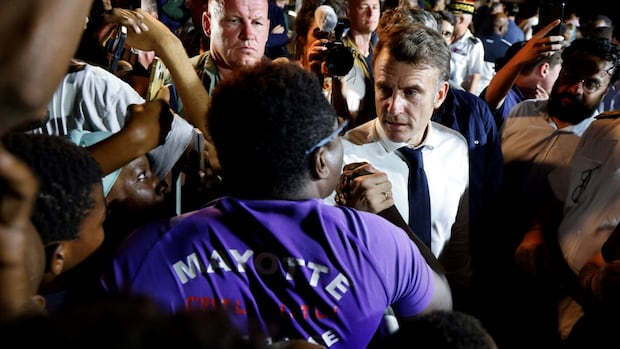French President Emmanuel Macron faced widespread frustration and anger from residents of Mayotte during his visit to the Indian Ocean archipelago, which is still reeling from the damage of the strongest cyclone to hit the region in nearly a century.
On Friday morning, Macron visited a neighbourhood in Tsingoni, on Mayotte’s main island, where people remain without access to drinking water or phone service nearly a week after Cyclone Chido.
As he walked through the area, some shouted, “We want water, we want water!”
Mayotte, with 320,000 residents and an estimated 100,000 additional migrants, is France’s poorest department. The cyclone devastated entire neighbourhoods, as many people ignored warnings, thinking the storm wouldn’t be so extreme.
Unable to see the above embed? View the angry exchange here.
Tension was palpable on Thursday evening, when Macron was met with boos from dozens of residents in Pamandzi, on Petite-Terre island, during the last stop of his first day in Mayotte.
People expressed frustration at the slow pace of aid efforts, with one woman launching an impassioned plea and resisting Macron’s attempts to put his hand on her shoulder or take the microphone to respond.
Macron eventually got hold of a microphone from someone else and said, “I have nothing to do with the cyclone. You can blame me, [but] it wasn’t me!”
Addressing the crowd, he acknowledged their hardship.
“You’ve been through something terrible. Everyone’s struggling, regardless of skin colour,” he said, urging unity.
Macron got angry in turn, shouting that if it wasn’t for France, residents would be in “10,000 times more shit.”
The French president added, “There’s no place in the Indian Ocean where people get so much help!” A woman could be heard saying “we disagree.”
Dozens of health-care workers unaccounted for
Macron is known for his appetite for debate and is used to being in crowds and confronting people who are angry at him. He explained that he stayed two days in Mayotte out of “respect and consideration” for the population.
The French president got a warmer welcome In Tsingoni on Friday morning. People urged him to help, with some posing for selfies with him, and others showing him their children.

Meanwhile, French military and local authorities were scrambling to repair busted water pipes across the islands and get water to villages that haven’t had any.
In the village of Mirereni, about 35 kilometres outside Mayotte’s capital in the north, Civil Security officers were trying to remove a large, felled mango tree that had busted a water pipe.
The pipe provides water to around 10,000 people in three nearby villages. But officials say repairing it might take a bit longer than usual because of the heat, which impacts equipment.
Locals said they’re worried the lack of water would cause disease. Earlier this year, there was a cholera outbreak on the island, with at least 200 cases.
At least 31 people have died during the cyclone and about 2,500 people were injured, including 67 in serious condition, French authorities said. But it’s feared hundreds or even thousands of people have died in the densely packed territory.
French Health Minister Genevieve Darrieussecq said Friday that 17 per cent of hospital staff and 40 per cent of all regional health staff on the archipelago are still unaccounted for.
“That’s around 60 to 70 people,” she said on news broadcaster FranceInfo, stressing a large part of the population still has no access to phone services.


